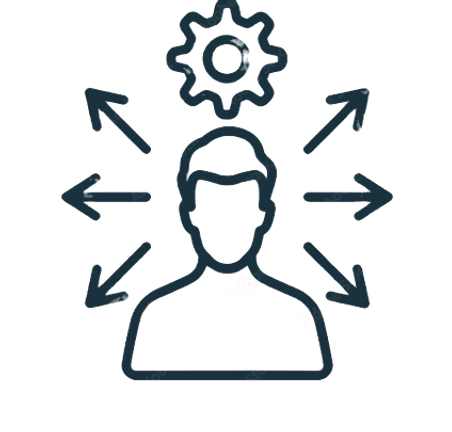
Adaptive Cognitive Behavioral Therapy (ACBT)
Welcome to the Adaptive Cognitive Behavioral Therapy (ACBT) homework site. ACBT is an advanced form of Cognitive Behavioral Therapy that focuses on modifying harmful beliefs and behaviors to help clients become better adapted to the experience of chronic anxiety.
Being better adapted to anxiety is more effective than simply chasing symptom relief, which is often temporary and can leave a person feeling on edge, unsure of when a flare-up will occur. When you are better adapted to anxiety, you become less focused on the symptoms themselves and more confident in your ability to skillfully tolerate anxiety, regardless of its intensity.
Maladaptive Responses
Anxiety Symptoms
Symptom Reduction (intolerance)
Future Anxiety Tolerance
Adaptive Responses
Anxiety Symptoms
Skillful Tolerance
Future Anxiety Tolerance
The Anxiety Conditioned Response (ACR)
Adaptive Cognitive Behavioral Therapy (ACBT) is designed to address The Anxiety Conditioned Response (ACR). The Anxiety Conditioned Response is a theoretical framework based on behavioral psychology. It provides insight into how and why anxiety issues are maintained over time and become chronic anxiety conditions.
According to ACR, through the subtle ways that we think and behave when anxious, a person can unknowingly condition themselves to have distressing anxiety experiences. ACBT can help a person to undo this conditioned response and help individuals to resolve chronic anxiety conditions.
Anxious Core Beliefs
-
Absolute beliefs about the world around you.
-
Subconscious beliefs are typically beyond our awareness
-
Applied to everything. We create beliefs for every situation we have ever experienced
Anxiety Symptoms
-
Originating from beliefs: Anxious core beliefs trigger the anxious fight, flight, or freeze response
-
Automatic, the anxious fight, flight, or freeze response is beyond our control
-
Encourages anxious behaviors. Anxious feelings encourage protective behaviors, called maladaptive behaviors.

Protective Behaviors
-
Avoidance. Removing oneself from the experience of an anxious trigger.
-
Safety Behaviors. If avoidance is not possible, doing things to make oneself feel less anxious
-
Reassurance seeking. Seeking assurance from trusted sources or respected people.
-
Worry. Chronic what-if-type thinking about the future.
-
Rumination. Chronic what-if-type thinking about the past.
Anxiety Reinforced
-
Protective behaviors reduce the ability to tolerate future anxiety
-
Low Anxiety Tolerance reinforces anxious core beliefs and anxiety symptoms.
-
Anxiety symptoms encourage anxious behaviors due to low anxiety tolerance.
-
Protective behaviors reduce the ability to tolerate future anxiety
Adaptive Anxiety Therapy Treatment Program
For Chronic Anxiety
Stage 1: Belief Tracking & Cognitive Exposures (4 modules)
Stage 1: Objectives
-
Identifying anxious core beliefs
-
Exposure to beliefs
-
Habituate & desensitize to beliefs
-
Neutral & indifferent responses to beliefs
Stage 2: Tracking Maladaptive Behaviors for Exposure (2 modules)

Stage 2: Objectives
-
Identifying anxious, maladaptive behaviors
-
Identify which behaviors are easy to give up
-
Identify behaviors that are somewhat difficult to give up
-
Identify behaviors that are difficult to give up
-
Create exposure hierarchy based on reducing anxious behaviors
Stage 3: Behavioral Exposures (6 modules)
Stage 3: Objectives
-
Create a behavioral exposure hierarchy based on reducing anxious behaviors
-
Progress through easy to difficult behavioral exposure
-
Reduce the use of all anxious behaviors when triggered.
-
Replace anxious behaviors with adaptive anxiety skills
Stage 4: Anxiety Relapse Plan (1 module)
Stage 4: Objectives
-
Create a detailed plan for how to return to adaptive behavior if symptom-based anxiety responses persist.
-
Move to check-in status
-
End standing appointments
Stage 3: Modules
Stage 4: Module
Module 13: End Treatment: Relapse Plan
